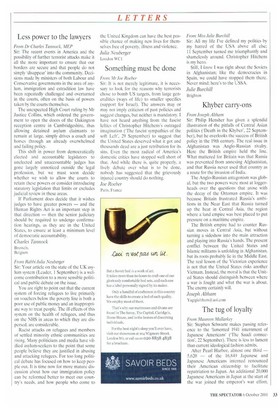Less power to the lawyers
From Dr Charles Tannock, MEP Sir: The recent events in America and the possibility of further terrorist attacks make it all the more important to ensure that our borders are secure and that people do not simply 'disappear' into the community. Decisions made by ministers of both Labour and Conservative governments in the area of asylum, immigration and extradition law have been repeatedly challenged and overturned in the courts, often on the basis of powers taken by the courts themselves.
The unexpected High Court ruling by Mr Justice Collins, which ordered the government to open the doors of the Oakington reception centre in Cambridgeshire, thus allowing detained asylum claimants to remain at large, simply drives a coach and horses through an already overwhelmed and failing policy.
This shift in power from democratically elected and accountable legislators to unelected and unaccountable judges has gone largely unnoticed outside the legal profession, but we must soon decide whether we wish to allow the courts to retain these powers or consider introducing statutory legislation that limits or excludes judicial review in these areas.
If Parliament does decide that it wishes judges to have greater powers — and the Human Rights Act is an important step in that direction — then the senior judiciary should he required to undergo confirmation hearings, as they are in the United States, to ensure at least a minimum level of democratic accountability.
Charles Tannock
Brussels, Belgium
From Rabbi Julia Neuberger Sir: Your article on the state of the UK asylum system (Leader, 1 September) is a welcome contribution to a more sensible political and public debate on the issue.
You are right to point out that the current system of forcing refugees to live primarily on vouchers below the poverty line is both a poor use of public money and an inappropriate way to treat people. The ill effects of this system on the health of refugees, and thus on the NHS in areas to which they are dispersed, are considerable.
Racist attacks on refugees and members of settled minority ethnic communities are rising. Many politicians and media have vilified asylum-seekers to the point that some people believe they are justified in abusing and attacking refugees. For too long political debate has focused on how to keep people out. It is time now for more mature discussion about how our immigration policy can be reformed better to meet our country's needs, and how people who come to
the United Kingdom can have the best possible chance of making new lives for themselves free of poverty, illness and violence. Julia Neuberger
London WC I


































































































 Previous page
Previous page